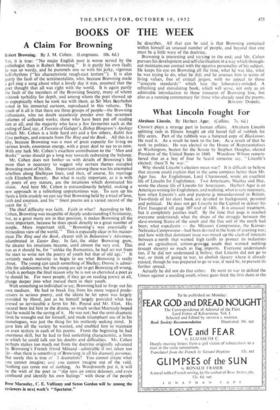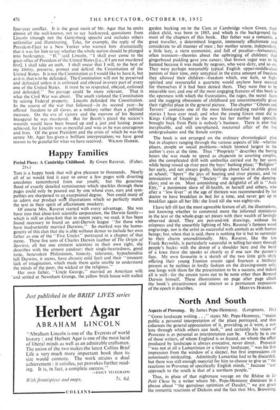What Lincoln Fought For
Abraham Lincoln. By Herbert Agar. (Collins. 7s. 6d.) CHANCE plays a strange part in human affairs. Abraham Lincoln splitting rails in Illinois bought an old barrel full of rubbish for fifty cents. Part of the rubbish was a battered copy of Blackstone. He read it. As a result he took to the law. As a result of that he took to politics. He was elected to the House of Representatives at Washington, beaten for the Senate by Stephen Douglas, elected President of the United States in 1860. Woodrow Wilson remem- bered that as a boy of four he heard someone say, "Lincoln's elected; there'll be war."
Why should Lincoln's election mean war? It is difficult to believe that anyone could explain that in the same compass better than Mr. Agar has. An Englishman, Lord Charnwood, wrote an excellent life of Lincoln for Englishmen. Two Americans, Nicolay and Hay, wrote the classic life of Lincoln for Americans. Herbert Agar is an American writing for Englishmen, and realising, what is very necessary, how often Lincoln's aim and purpose js misunderstood in Britain. Two-thirds of his short book are devoted to background, personal and political. He does not get Lincoln to the Capitol to deliver his First Inaugural till page 107 (out of 140). It is unusual treatment, but it completely justifies itself. By the time that page is reached everyone understands what the shape of the struggle between the slave-owning States of the south and the free soil of the north had been; what expedients — the Missouri Compromise, the Kansas- Nebraska Compromise—had been devised in the hope of averting war; and how with that dominant issue was mixed up the clash of interests between a north that wanted high tariffs to protect its industries and an agricultural, cotton-growifg south that wanted nothing (except slavery) so much as fr imports. Everyone understands too, if he did not understand it before, that Lincoln did not go to war, or think of going to war, to abolish slavery where it already existed, though he was prepared to go to war, if need be, to prevent its further spread.
Actually he did not do that either. He went to war to defend the Union against a seceding south, whose guns fired the first shots in the
four-year conflict. It is the great merit of Mr. Agar that he omits almost all the well-known, not to say hackneyed, quotations from Lincoln (though not the Gettysburg speech) and includes others unfamiliar and illuminating. Take, for example, the reply of the President-Elect to a New Yorker who warned him dramatically that it was for him to say whether the whole nation should be plunged into bankruptcy. "If," said Lincoln, "I shall ever come to the great office of President of the United States [i.e., if I am not murdered first), I shall take an oath. I shall swear that I will, to the best of my Ability, preserve, protect and defend the Constitution of the United States. It is not the Constitution as I would like to have it, but as it is, that is to be defended. The Constitution will not be preserved and defended unless it is enforced and obeyed in every part of every one of the United States. It must be so respected, obeyed, enforced and defended." No passage could be more relevant. That is what the Civil War was about. The south violated the Constitution by seizing Federal property. Lincoln defended the Constitution. In the course of the war that followed—in its second year—he offered freedom to all slaves, as a military rather than a political measure. On the eve of victory and the morrow of his Second Inaugural he was murdered. But for Booth's pistol the nation's wounds would have been bound up and a just and lasting peace achieved, for Lincoln was as merciful and wise as he was courageous and firm. Of the great President and the crisis of which he was the centre Mr. Agar has given a brilliant interpretation; we have good reason to be grateful for what we have received. WILSON HARRIS.



































 Previous page
Previous page